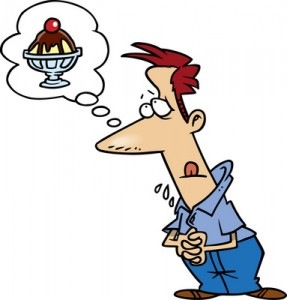 Physical – or real – hunger, the kind you feel when your stomach is growling, you’re irritable as all get-out, you’ve got zilch energy, and probably a throbbing headache, means you body needs food for fuel.
Physical – or real – hunger, the kind you feel when your stomach is growling, you’re irritable as all get-out, you’ve got zilch energy, and probably a throbbing headache, means you body needs food for fuel.
Info You Can Use About Hunger
- Hunger is somewhat unpredictable. Your actual hunger levels are not the same every day and can be affected by what your body needs and does — like activity, hormone levels, sickness, and other things.
- Hunger doesn’t necessarily follow a time schedule. You can adjust the types and amounts of your meals and snacks to influence the next time you will be hungry. Eating just because the hands of the clock are at noon or 6PM – even though you’re not hungry – can lead to weight gain and unhealthy eating habits.
- What you eat affects your hunger level. Carbs, fat, and protein are digested at different rates. Simple, refined carbs like soda and candy are digested rapidly. They give you quick energy from a surge in your blood sugar – which is followed by a rapid drop in your energy. Protein foods give you the most sustained blood sugar levels and satiety without the blood sugar spikes. Eating food that has a balance of nutrients is probably the best way to satisfy your hunger, keep you feeling fuller longer, and give your body the fuel it needs.
- How much you ate at your last meal affects you hunger levels since larger meals take longer to digest. Haven’t you ever eaten so much for dinner that you’re not hungry until lunch the next day?
- You can put off eating for a while –occasionally ignoring your hunger won’t cause a long-term or significant drop in your metabolism. If you do postpone your hunger the urge to eat will come back and may be stronger when it does return.
- Your stomach is about the size of your fist and can be filled by a palm full of food. Of course, since your stomach is a muscle, it can also stretch. When you stretch it out by putting in too much food you probably don’t feel so great (like overly stuffed at Thanksgiving). When you eat small meals you’ll get hungry more often and perhaps fuel your body more efficiently. This is the rationale for 5 or 6 small meals a day rather than two or three larger ones.
- Your body is smart. Have you noticed that sometimes you are hungry for a specific food? It might be your body’s way of letting you know that it needs a particular nutrient. Careful: sometimes that hunger is head or emotional hunger that popped up because you just passed a bakery and the smell of just-baked chocolate chip cookies is acting like a trigger!
- All kinds of foods can play a role in satisfying your hunger. Labeling food good or bad puts the food in charge. Depriving yourself of a particular food or attaching special meaning to it can set you up for cravings and overeating. It gives the food power over you rather than vice versa. Allowing yourself to make good choices from all foods; eating when you’re hungry; and eating portions that satisfy and not stuff you, put you, not the food, in charge.
Next post
When Should I Eat: a numbered scale to help you figure out how hungry you are and when to eat.

Leave a Reply